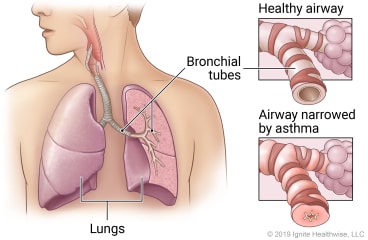Overview

Asthma makes it hard for you to breathe. During an asthma attack, the airways swell and narrow. Severe asthma attacks can be dangerous, but you can usually prevent them. Controlling asthma and treating symptoms before they get bad can help you avoid bad attacks. You may also avoid future trips to the doctor.
Follow-up care is a key part of your treatment and safety. Be sure to make and go to all appointments, and call your doctor if you are having problems. It's also a good idea to know your test results and keep a list of the medicines you take.
How can you care for yourself at home?
- Follow your asthma action plan so you can manage your symptoms at home. An asthma action plan will help you prevent and control airway reactions and will tell you what to do during an asthma attack. If you do not have an asthma action plan, work with your doctor to build one.
- Take your asthma medicine exactly as prescribed. Medicine plays an important role in controlling asthma. Talk to your doctor right away if you have any questions about what to take and how to take it.
- Take your controller medicine. If you have symptoms often, you will likely need to take it every day. Controller medicine usually includes an inhaled corticosteroid. The goal is to prevent problems before they occur.
- Use your quick-relief medicine when you have symptoms of an asthma attack. Some people need to use quick-relief medicine before they exercise to prevent asthma symptoms. Albuterol is a quick-relief medicine that is often used. In some cases, a certain type of controller inhaler is used as a quick-relief medicine. Ask your doctor what to use for quick relief.
- If your doctor prescribed corticosteroid pills to use during an attack, take them as directed. They may take hours to work, but they may shorten the attack and help you breathe better.
- Keep your medicines with you at all times.
- Talk to your doctor before using other medicines. Some medicines, such as aspirin, can cause asthma attacks in some people.
- If you have a peak flow meter, use it to check how well you are breathing. This can help you predict when an asthma attack is going to occur. Then you can take medicine to prevent the asthma attack or make it less severe.
- See your doctor regularly. These visits will help you learn more about asthma and what you can do to control it. Your doctor will monitor your treatment to make sure the medicine is helping you.
- Keep track of your asthma attacks and your treatment. After you have had an attack, write down what triggered it, what helped end it, and any concerns you have about your asthma action plan. Take your diary when you see your doctor. You can then review your asthma action plan and decide if it is working.
- Don't smoke, vape, or use other tobacco or nicotine products. If you need help quitting, talk to your doctor about quit programs and medicines. Try to avoid being around smoke or the aerosol mist from vaping.
- Learn what triggers an asthma attack for you, and avoid the triggers when you can. Common triggers include colds, smoke, air pollution, dust, pollen, mold, pets with fur, cockroaches, stress, and cold, dry air.
- Avoid infections such as COVID-19, colds, and the flu. Wash your hands often. Get a flu vaccine every year, as soon as it is available. Stay up to date on your COVID-19 vaccines.
When should you call for help?
Call 911 anytime you think you may need emergency care, and keep using your asthma action plan until help arrives. For example, call if:
- You have severe trouble breathing.
Call your doctor now or seek immediate medical care if:
- Your symptoms do not get better after you have followed your asthma action plan.
- You cough up yellow, dark brown, or bloody mucus (sputum).
Watch closely for changes in your health, and be sure to contact your doctor if:
- Your coughing and wheezing get worse.
- You need to use quick-relief medicine on more than 2 days a week (unless it is just for exercise).
- You need help figuring out what is triggering your asthma attacks.
Where can you learn more?
Go to http://www.healthwise.net/patientEd
Enter C107 in the search box to learn more about "Asthma in Teens: Care Instructions".
Current as of: September 29, 2025
Author: Ignite Healthwise, LLC Staff
Clinical Review Board
All Ignite Healthwise, LLC education is reviewed by a team that includes physicians, nurses, advanced practitioners, registered dieticians, and other healthcare professionals.

